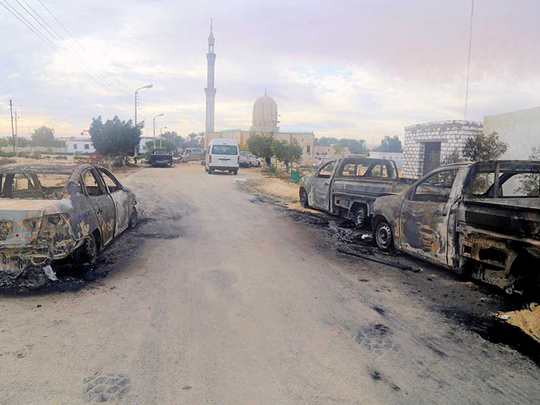
Cairo: Friday’s attack on a North Sinai mosque, which claimed 305 lives, is set to rally Egyptians around President Abdul Fattah Al Sissi in his unrelenting campaign against terrorism, politicians and experts have said.
“Such terrorist operations boost the people’s rallying around the president and the army in their efforts to eradicate terrorism,” Mohammad Al Kawi, a member of parliament, told Gulf News.
“Terrorists have a known agenda aimed at destabilising [the country] and blocking progress being implemented by President Al Sissi in all fields,” Al Kawi, an MP for the liberal Free Egyptians Party, said.
In the aftermath of the attack, the deadliest in Egypt, Al Sissi vowed a “brutal” response. The air force unleashed a string of strikes against militant hotbeds near the site of Friday’s massacre and killed an unspecified number of the perpetrators, according to the security forces.
The attack came in response to recent “successful” raids by security forces on terrorists, MP Mustafa Bakri, a lawmaker close to the government, said.
“[But] this terrorist act constitutes a development in the terror operations in the country as it comes after the terrorists’ obvious failure in targeting security gatherings,” Bakri said in an article in private newspaper Al Watan.
Egypt has seen a wave of militant attacks since 2013 when the army, led by Al Sissi, deposed Islamist president Mohammad Mursi following mass protests against his rule.
“The fall of such a large number of people in this massacre necessitates more effective measures against terrorism, the least being referral of all terror cases to the military courts,” Bakri said.
Military tribunals often issue swift rulings, but critics say they do not provide enough guarantees for a fair trial.
A lengthy litigation process at civil courts plays into the hands of terror masterminds, according to government loyalists.
“The Brotherhood leaders, who incite such operations, are still away from the gallows although they have been convicted. This delay sends the message to many terrorists that they are far from execution,” argued Bakri.
The parliament, led by Al Sissi’s backers, has said it will meet on Monday to look into the “consequences” of Friday’s attack amid calls for passing tougher anti-terror laws.
The Egyptian government has repeatedly blamed the Brotherhood, from which Mursi hails, for the spate of the attacks that has struck the country since his ouster. The Islamist group, designated as a terrorist organisation, has denied links to violence.
“The latest attack shows that the terrorists have lost their senses, a matter that must make the state and the people more vigilant,” Salah Al Hadi, a political analyst, said.
“By attacking a mosque, the terrorists wanted to send a message that there is no limit to their evil, including houses of God,” Al Hadi told Gulf News.
In his opinion, the aim of such acts is to make Egyptians lose confidence in state institutions and cripple ongoing efforts to revitalise the country’s struggling economy.
“I think the opposite is true. Egyptians are going about their lives as normal, believing the terrorists will be eventually vanquished as happened in the 1990s,” he said, referring to a series of deadly attacks that targeted government officials and civilians in that decade.
He expects Egypt to take tougher security steps along its long border with troubled Libya and in North Sinai, a hub for radicals.
“Recent rapprochement between Cairo and Hamas will help Egypt tighten its grip on security in North Sinai,” he said, referring to the Palestinian group.
“May be the Egyptian government will have to temporarily evacuate North Sinai from civilians in order to make it easier for the army to cleanse the area of terrorists,” Al Hadi said.
Tharwat Al Kharbawi, a Brotherhood dissident, sees Friday’s attack as a “serious shift” in terrorists’ strategy in predominantly Muslim Egypt.
“The final tactic of terrorist groups is to target civilians with the aim of striking panic in people and making them feel that the government is unable to protect them,” he said.
“They previously did this when they attacked churches in order to raise the Copts’ anger against the government. Now their sights have shifted to mosques, which are easy targets because unlike churches, they are not under security protection,” Al Kharbawi said.
While security was tightened in North Sinai around mosques, the government has not said if it will do the same to other mosques across the country.
Authorities have tightened their hold on mosques over the past four years, denying the Brotherhood and allied groups a major platform to influence the worshippers.












